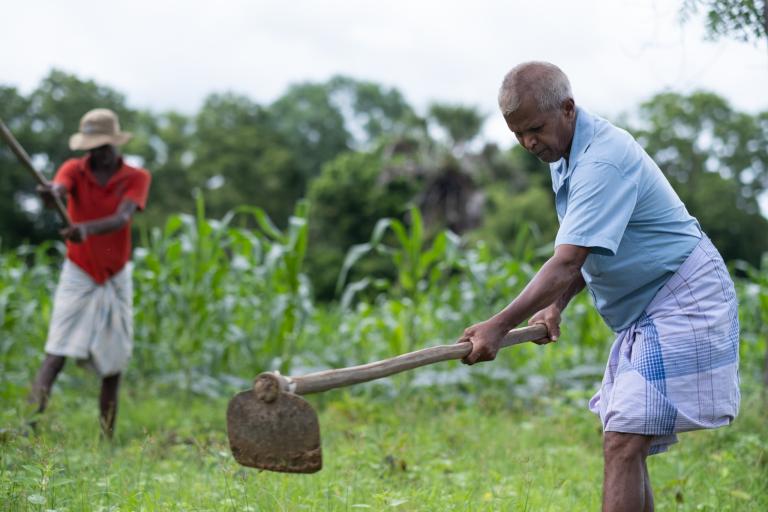
Malnutrition remains a concern in Sri Lanka, even though undernourishment has decreased in recent years. Challenges remain with access to healthy diets and food supply chain issues due to COVID-19 impacting the availability, pricing, storage, and quality of food. The UN, therefore, has focused on maternal and child malnutrition, ensuring the provision of food security and nutrition services, and working on alternative options in cases where food delivery platforms are disrupted.
Along these lines, the UN supported initiatives to address malnutrition, especially among vulnerable groups. Provision of ‘Thriposha’ supplementary food for over 625,000 children and pregnant and lactating mother was ensured through WFP-assisted importation and quality control of maize. Home gardening was promoted by FAO and UNDP among more than 42,200 vulnerable families and by WFP in schools enabling sustenance of the healthy school meals programme. UN support to strengthen the overarching policies and strategies to reinforce nutrition was provided through UNICEF-led development of the School Health Policy and the formative research on maternal, infant, and young child feeding.
To bolster services for growth monitoring, early detection, and treatment of child wasting, the UN supported children with Severe Acute Malnutrition (SAM), while UNICEF enabled procurement of growth monitoring equipment for 289 child welfare clinics and multiple micronutrients for over 1,750,000 children. The UN also provided technical support to analyse gaps in the nutrition information system, including making recommendations to match global indicators. UNICEF and partners helped introduce protocols on the treatment and management of SAM and Moderate Acute Malnutrition (MAM) to 8,200 health care workers, benefitting 150,000 children, and 2,200 children were provided with BP-100 to ensure adequate treatment of SAM. WHO support in upgrading the District Nutrition Monitoring System addressed non-nutrition risk factors in affected children. At the Nutrition for Growth Summit, the Government of Sri Lanka committed to relevant targets on ensuring adequate nutrition and food security.
WHO supported implementing the National Salt Reduction Strategy and successfully advocated for regulation to eliminate industrially produced transfats, boosting healthy diets for adults in the long term. WFP supported a biannual Cost of Diet Analysis that informs the government of the status of food security and improves targeting of related interventions.
The UN also worked to expand social protections to safeguard access to nutritious diets and essential services, facilitating surveys to identify possible gaps in food security. WHO and UNICEF jointly supported a survey on gaps in energy and nutrition consumption in households. A national survey on the practice of National Nutrition Quality Standards in residential care institutions for older persons shed light on the nutritional status of the elderly.
UNICEF advocacy resulted in the expansion from 10 to 24 months of an existing universal nutrition programme that provides vouchers for pregnant and lactating mothers. WFP pre-registered in its own platform some 6,500 beneficiaries from the national social protection system in flood-prone areas, enabling more effective delivery of assistance.
Support to the national nutrition and food security agenda was provided by UN agencies through strategic advocacy for the implementation of the Multi-Sectoral Action Plan for Nutrition. The National Roadmap on Urban Food Waste Prevention and Reduction was supported by FAO, and WFP strengthened the Scaling Up Nutrition (SUN) movement strategy to include SMEs.
UN support to address food security came in many forms, including FAO-provided technical assistance to address gaps in forest management in rural communities; WFP research on food system environments; and improvements to nutrition-sensitive resilience programming in partnership with international research entities. FAO, meanwhile, provided training to 500 field-level officers for the management of fall armyworm, a destructive crop pest.
UN Habitat supported sustainable farming and organic home gardening among vulnerable communities, while over 2,350 women farmers increased their annual average income through UNDP-supported climate-smart home gardens. Together with the Meteorological Department, weather advice via SMS and media benefitted close to 300,000 farmers, while support to smallholder and organic farmers included post-harvest management, value addition, market linkages, and sustainable practices.
As water and sanitation are key to good health and nutrition of a community, WHO’s technical assistance on water safety plans (WSPs) ensured alignment with health- based targets, improving the availability of safely managed drinking water. UNICEF supported a water quality survey for drinking water and a national assessment of rural communities’ water supply schemes, now included in the national monitoring system. The UN also supported development of a Country Road Map for Hand Hygiene, and provided WASH facilities for vulnerable populations in institutional care.
Critically, monitoring of rising food prices across staples has become a core issue as it is a potential challenge undermining peace and development progress to date. Inflation across most food types is viewed as a rising socio-economic risk.

